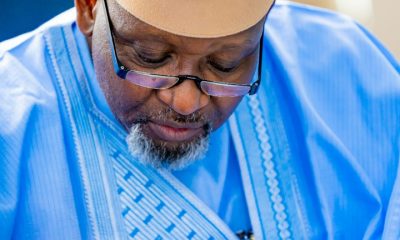Personality Interviews
ABUJA MoU: WE FUNCTION BEHIND A MASK, says Capt Umoren
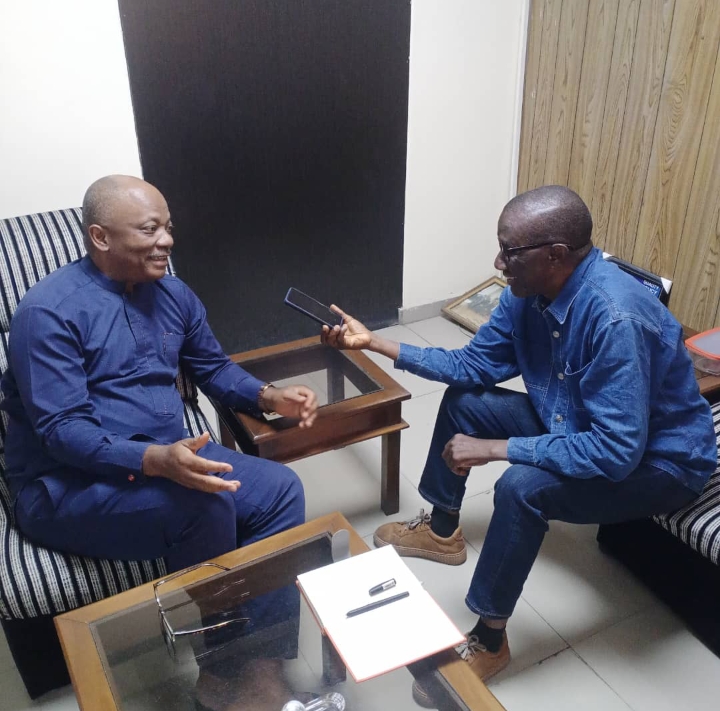
Capt Sunday Umoren, the Secretary-General, Abuja Memorandum of Understanding on Port State Control in West and Central Africa (Abuja MoU) is an interviewer’s delight any day.
In this exclusive chat with Falcon Watch Online, he clears the air on the widely-held impression that the agency is grossly under-reported. Among other issues, he talks about the job of MoUs worldwide, relationship with the IMO and the ILO, training of port state control officers, challenges of bilingualism and marine pollution.
IZUCHUKWU OZOEMENA reports.
Q: Do you share concerns that the Abuja Memorandum of Understanding (Abuja MoU) is grossly under-reported?
Ans: I can actually understand people’s point. They also need to understand what Abuja MoU is all about. It’s a regional body covering 22 countries – from Mauritania down to South Africa for the West and Central African region. What do we really do? We’re set up to harmonize an inspection regime such that substandard vessels do not trade within the region. Most of the things we do are not for us to be there in the dailies- calling people around us to showcase.
We have the headquarters in Nigeria, meaning that we are the host country to the MoU. In the Charter, we are supposed to be an even-playing field; whatever we do in Nigeria, we must do in other member-countries in the region. So, Nigeria should not unduly influence the activities of the Abuja MoU.
You can actually see where the skewed understanding is coming from. In Nigeria, we are not the field workers or those who actually go out there to do the job. Who works for us? The maritime administrations in all the member-states work for us. In Nigeria, NIMASA runs the show for us; in Ghana, it is the country’s maritime authority; in Cameroon, the maritime authority runs it. It is same in Sierra Leone and any other member-country. We can’t come out to compete with the maritime administrations in all the nations. But we coordinate the activities with respect to port state control. After that, we work towards training the port state control officers to ensure they meet international standards. Probably, that’s the major reason to say that we are under-reported.
Maritime administrations in the host nations wear our mask and carry out the activities with respect to port state control. Abuja MoU is happy about it. If same thing happens in Ghana or any other host country, Abuja MoU is happy about it. That’s where we are.
Q: How do the MoUs relate with the International Maritime Organization (IMO)?
Ans: The IMO Resolution 689 brought about the Abuja MoU regime. It’s the IMO that partitioned the maritime world into 9 regions. IMO is the founding father, the bedrock and that shoulder we stand on in the execution of our functions. What are the mandates? All the mandates and relevant instruments we have are IMO and ILO Conventions. These are what our port state control officers use in the inspection regime.
Q: In a nutshell, take us through the specific mandate of Abuja MoU especially as regards the monitoring of vessels in and out of the ports.
Ans: As I said earlier, the major mandate is to ensure that no substandard vessel trades within the region. You do that by harmonizing the inspection regime so that whatever a vessel is subjected to in a particular country applies to others. It is the safety net that covers the regime that no substandard vessel can slip through because wherever you go, you can be fished out. That’s basically what we do. How do you get this done? You do this by having inspectors, those you call port state inspectors from the maritime administrations conducting the inspection to check every vessel that comes to confirm that it meets international standards. When a vessel defaults, she is either asked to fix the deficiency before leaving the port or detained until this is done. We have cases in Senegal where a vessel had been detained for over a year. It is not punitive but purely to enforce standards. We don’t work against the commercial interests of ship owners. We work on enforcement to ensure that there is compliance. When this is so, it means the vessel is safe with respect to operations, safety of the crew onboard, the waterways and the ancillaries. For instance, if a tanker comes into a port that is not safe and explodes, the whole thing is gonna blow up. What about protecting the marine environment against pollution? You have a vessel of 100,000 tons carrying oil getting involved in an accident and the oil spills into the waters. Where’s that gonna put us?
We talk of blue economy. What’s the bedrock of blue economy? If there’s no enforcement of international conventions and rules, the environment is affected, the blue economy is seriously affected. Fishing, maritime tourism and related activities will come to a standstill. Even drilling will be affected because if you have oil spill covering the entire area, it’s an exposure. We eliminate the use of substandard vessels; we work towards protecting the marine environment by having well trained inspectors who we constantly train and retrain. We link countries struggling to have minimum standards to others that are doing well through our mentor-mentee scheme in which Gambia port state control officers are currently being mentored by NIMASA.
We also work with maritime training institutions within the region to ensure that they
have certificated programmes to train port state control officers. Most countries send their staff to Italy and this is quite expensive. If we have such training locally, we can train more. The front runners we have are called port state control officers. We’re also looking at engaging the port authorities. There’s a training package we have already announced at first such as with PMAWCA for us to come in and sit with the port authority. Call it training or sensitization on the need to synergize and work together. But sometimes, the port authority may misunderstand the actions we take especially concerning risk assessment, elimination of risks which actually pays off at the end of the day.
We’ll not unduly detain a vessel. It is only when we realize that the condition of the vessel exposes the environment to risks. We have such training packages; we are the first MoU to think about that. Other MoUs are looking at doing such things too. If we don’t have the policy makers supporting the port state control officers, we end up beating the air. We also work to get training for policy makers as was done in 2021 when we did it for directors-general of maritime administrations in the region being brought into Lagos by the IMO for a training. There will be a second one next year. So, we’re looking at every foreseeable action that can help us achieve our aims. We also have ships called standard ships. Other MoUs can also flag some vessels and question us on them, saying they had issues years back. We work with countries that have maritime domain awareness to track such vessels. We try to see what such vessels are and inform all member-states about the location and movement and they will be prepared to wait and apprehend such vessels. Why do we bother about substandard vessels? They are the major causes
of maritime accidents.
Q: Can you comment further on your recent training in Nigeria?
Ans: It is the mentor-mentee scheme by which NIMASA is mentoring port state control officers from Sierra Leone. Harmonization of the port state regime is for all countries to be at par such that none is doing poorly. However, there is a bit of issues with capacity development in some countries. Some are struggling while some others are doing extremely well. By our Charter, member-states should inspect a minimum of 15% of vessels calling at their ports. Some countries are struggling to meet the number probably because they don’t have sufficient port state control officers. What we do is merge a struggling nation with the ones doing so well.
We started with the Nigeria-Sierra Leone mentor-mentee training currently going on. It is a structured on-the-job training programme endorsed by us. There are also other levels whereby some port state control officers, say, from Nigeria, could be taken to other countries to work for a period and bring them up to speed. I am proud to tell you that we started this a year ago.
The MoU regime is like a family. We stick together, we learn from one another and support one another. In Paris, if MoU has trainings to do, it could call us to join. At the end of the day, the harmonization is moving away from being regional to global. Whatever you see in Paris is what you see in West Africa. Two other MoUs have also looked at taking up the mentor-mentee scheme which we also learn from. We are getting to that point where people take up innovative ideas we bring to the table.
Q: Plastic waste and other junks still litter Nigerian waters, talking about MARPOL @ 50 and the need for cleaner waters. Aren’t you concerned?
Ans: By virtue of our position which is similar to what the IMO does, we’re on the side of advocacy. We don’t go criticizing our member-states but we engage them to ensure they respect, implement and enforce all IMO conventions. MARPOL is specifically for the protection of the marine environment and this is key. If you comply and implement the stipulations, we’re guaranteed cleaner seas and safer environment.
We also work with the technical co-operation department of the IMO to specifically support the member-states on compliance with specific IMO conventions on ballast water management, MARPOL Annexe 1-6, etc. If vessels are compliant, it means less pumping of effluents into the sea. We’ll have safer seas. That’s what we are working out with the maritime administrations. Most pollutions into the sea often do not originate from ships. You’ll be surprised that some people intentionally dump waste into the sea. Some hotels by the coastal waters pump their effluents into the sea. Our appeal to everyone is to understand that the marine environment is our world. If you’re lucky to be in the littoral area bordering the sea, you have the chance of enjoying the aquatic front to harvest fish and for swimming. Visitors will like to visit your country.
Go to Brazil and see their coast. Tourists flock there. But if you mess up your beach, nobody comes and you’ll be losing out in an aspect of the blue economy.
Every country is actually supposed to map out its maritime cluster. What can you actually do from the sea? Where can you create a niche? If we work together towards projecting the marine environment, we’ll be thumbing up for the blue economy. If you are probably on a speed boat and see a ship pumping something into the sea, call the maritime authority. If you notice a vessel smoking into the air for more than a minute, report to the maritime administration. By so doing, you are part of the enforcement team helping to make our seas safer for all. It is a joint effort.
Q: How does the Abuja MoU manage the challenge of bilingualism in West Africa?
Ans: What works for us is that the port state control is an English project. Even in the Paris MoU, meetings are conducted in English. In Abuja MoU, however, we have three official languages. In our meetings, we translate in French and Portuguese. We work together to appease the Anglophone, Francophone and Spanish member-countries.
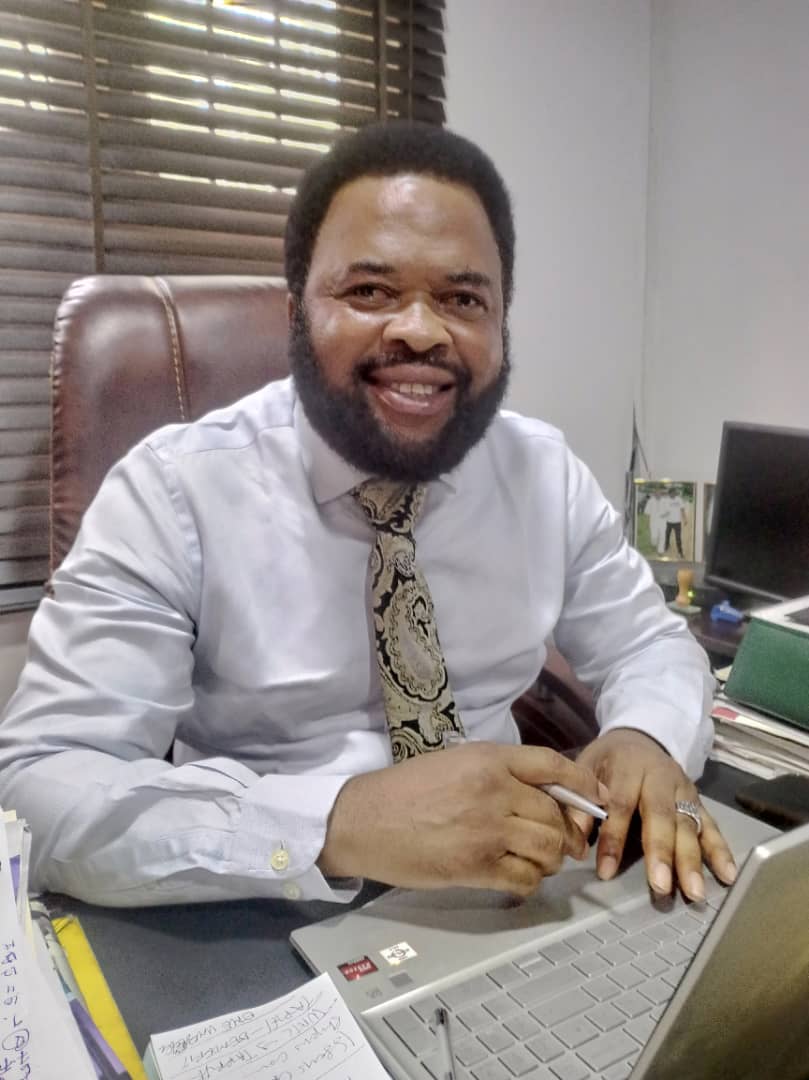
Digital freight forwarders’ group, the African Association of Professional Freight Forwarders and Logistics of Nigeria (APFFLON) has refused to be cowed by criticisms of her concerns about what it describes as an unjust tariff hike by the West African Container Terminal (WACT), Onne Port, raising fundamental questions about the foreign terminal operator. In this personality interview granted Falcon Watch Online Daily recently, APFFLON chieftain, Otumba Frank Ogunojemite, raised fundamental questions about WACT and expressed worry that for whatever reasons, the Nigerian Shippers’ Council (NSC) appears complicit in this operational illegality.
Otumba Ogunojemite also discussed the rejuvenated Council for the Regulation of Freight Forwarding in Nigeria (CRFFN), the new Registrar and other matters.
Izuchukwu Ozoemena reports
Q: Your organization, the African Association of Professional Freight Forwarders & Logistics of Nigeria (APFFLON) is being accused of constituting an opposition to other freight forwarding groups and regulatory agencies. Do you agree?
Ans: I don’t know where the view is coming from that some people are operating illegally when you do not do your homework properly before going public. This can lead you to jail. That was the reason we had about 16 court cases when we started . CRFFN was not excluded as we took them to court. It was a dialogue with Abubakar Tsanni, the CRFFN Board Chairman, that resolved the matter out of court.
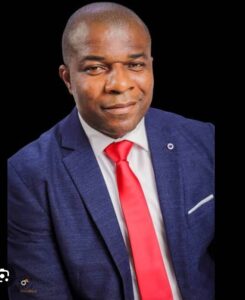
Kingsley Igwe, Registrar/CEO, CRFFN
So, when someone says APFFLON is attacking anybody, he is ignorant and not conversant with what is happening in the industry. When you’re pushed to the wall, you don’t resort to thuggery; you resort to justice. Justice is what can bring satisfaction. When you are dissatisfied with judgement, you go to appeal court rather than resorting to thuggery. So, you don’t just brand somebody without doing your own work. That’s careless talk.
We have a robust relationship with the Nigerian Shippers Council. They’re the only agency that has visited this office (the APFFLON Secretariat). But when you are taking decisions that can inflict pains on the citizens and the economy; when you are making decisions contrary to the Federal Government’s agenda, it’s a different matter.
During the National Single Window discussions, the FG admitted that the cost of doing business in Nigeria is very high and looked for ways to reduce costs to 25%. It’s not up to 60 days some people came up with 80% and 100% increament which, to us, shows injustice and an attempt to sabotage the FG’s initiatives to address port costs. Because we have a relationship, we wrote you to say ‘please look at this issue critically’. You ignored the letter. What d’you expect us to do? Do we have to leave the citizens to keep crying? Do we have to close our eyes for the economy to keep bleeding? Do we have to close our eyes on the need to alert you on what is contrary to the FG’S initiatives on port reformation and cutting costs? However, discrepancies on decisions will not affect our relationship.
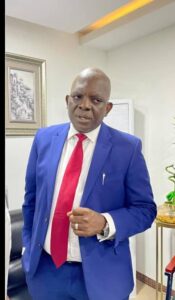
Pius Akutah, ES/CEO, Nigerian Shippers’ Council.
Q: What is the problem with operations at the West African Container Terminal (WACT), Onne, which you are kicking against?
Ans: The problem is tariff increment. It’s exactly the same time last year you increased; this time, you’re increasing. The Shippers Council said this increment was by the past Executive Secretary. If the past ES agreed on an increment, can’t the present ES do a review? The person that left did not finish his first term, talkless doing a second tenure. When we now have you onboard, you must be able to assess what was implemented in the past. If it has issues, you can suspend it. We have to reference how the Nigeria Customs suspended the 4% of FOB charges. So, why are you remaining adamant in the same industry, in the same country?
We suspected a compromise between WACT and the Nigerian Shippers Council. This has given us an insight into the establishment of WACT. How did they come to be? How long have they been there? For how long will their contract last? Are they going to have the contract for ever? These are the things that call for clarification. Don’t forget, WACT is a sister company of APMT. What is the synergy there? We need to review all these. Originally, they are from Maerskline, a foreign company. Do we fold our hands for our funds to be on capital flight? Do we continue to fold our hands and see our businesses go to foreign countries? Do we fold our hands for smuggling to continue to rise and cost of operation become unnecessarily expensive in the country? That is what calls for alarm.
Q: Pinpoint a particular way your group is suffering a disadvantage from the tariff hike by WACT.
Ans: Directly, we don’t suffer anything from the tariff hike . But indirectly, every citizen of Nigeria is suffering the high cost of living. You can check up the per capital income of individuals. For now, 20 governors are not paying the N70,000 minimum wage. But you are doing a yearly increment in the same market, in the same country. These people are very smart: they make 100% storage that will negatively affect the people. They look for an area to make money. What things justify the increment? What are they doing new? Is it the salary increment or tax increment or community support increment?
Look at the situation of things in Onne. We were there to notice that the villagers remain what they are. What are they doing differently? It’s high time we all came together to look at how to address the issues of this country. We will not continue to remain silent. APFFLON will continue to stand out and say the truth.
Q: It appears APFFLON is the only association out to say these things the way they are. Others are not saying much. Do you suspect something?
Ans: There are so many associations and issues in the industry. When we are addressing the WACT matter, other associations may be addressing other issues. For instance, haulage from Apapa, Tincan to Trade Fair, Mainland is now very costly. The network problem from banks is another matter.
Sometimes you want to capture, the bank gives you 2 or 3 days yet you cannot pay your duties. We have so many issues to bring to the table and address together. If you think they are not talking as expected, that you are a slow responder does not mean people are not talking. I read where Chief Emenike Nwokeoji of ANLCA reacted and lampooned Nigerian Shippers Council on this increment. Instead of talking about that, they’re talking about APFFLON.
It is high time the media asked the CRFFN why APFFLON is not acredited, despite her inputs so far. When someone says you are operating illegally, he should explain why and how.
Q: Government has been foot- dragging on the renewal of ports concession to private terminal operators. Is this proper?
Ans: It’s not proper. You know the reason for ports concession is the inefficiency of the Nigerian Ports Authority. Ports were concessioned to improve effectiveness and reduce costs. But what we are seeing now is exploitation by shipping and terminal operators.
After COVID 19, I expected the FG to look critically at the concession review. That time, the FG gave a directive that all consignments should be free from charges. But despite this, they collected rates from people. Shippers Council was almost losing control in trying to address the issues. We took pity with the Council for not being in control as they do not have legislative powers. That’s why we seconded them to appear on a bill so that they could have the power to be able to punish offenders. But looking at the way they are handling things now, we are beginning to feel that they are still incapacitated to handle this people even if the bill is passed.
If they cannot control the WACT tariff because somebody has agreed with them, an agreement that is not in the Act, that can be re-visited, we doubt their capacity to handle the ICTN.
Whoever is to lead this country must operate democratically. When an alert on an idea is given to you by an organization you know that has been with you for so many years, you should be able to listen and feel the pains of the citizens of this country. You should be able to support the FG’s initiatives, not going contrary to them.
So, the issue at hand is how do we survive in this country? What is going to be the contribution of each of us? Our pain is not personal; it’s for the citizens of this country. It’s for importers and exporters of this country because maritime is the economic catalyst of any country. Before the evolution of oil, maritime has always been there.
Look at the dwelling time and what they call war risk insurance. This is the amount charged a vessel on the sea as it sails through an area susceptible to piracy attack or robbery. Nigeria is one of the highest globally because shippers do not feel safe to ply our shores for fear of hijack. What is the Shippers Council doing? What’s NPA doing? What are leaders in the industry doing? Many of us in the industry do not even know what is called war risk insurance. A vessel pays $30,000 for how many days? Where will it get the money? The cost is coming back on the citizens who eventually consume the goods or services the vessels carry. Maritime theft, illegal fishing, all over, Nigeria is losing money and they are there increasing tariff. What they are looking for is an avenue for government to make more money at the expense of the suffering masses.
APFFLON will continue to do its best – advocacy. We continue to address issues as they are. We congratulate the CG of Customs following the achievement of PAAR. People have been wondering why we did that. If Webb Fontaine was not suspended, would there be B’Odogwu today. If you follow the antecedents of APFFLON in the industry, you ‘ll know that we do not joke with the issue of server provider. We are the only association that brought together the Senate and House of Reps on the issue of Webb Fontaine. The record is there.
Personality Interviews
TRADE FACILITATION: FULFIL CUSTOMS REQUIREMENTS, ENJOY AEO, B’ODOGWU, says Ayokunle.
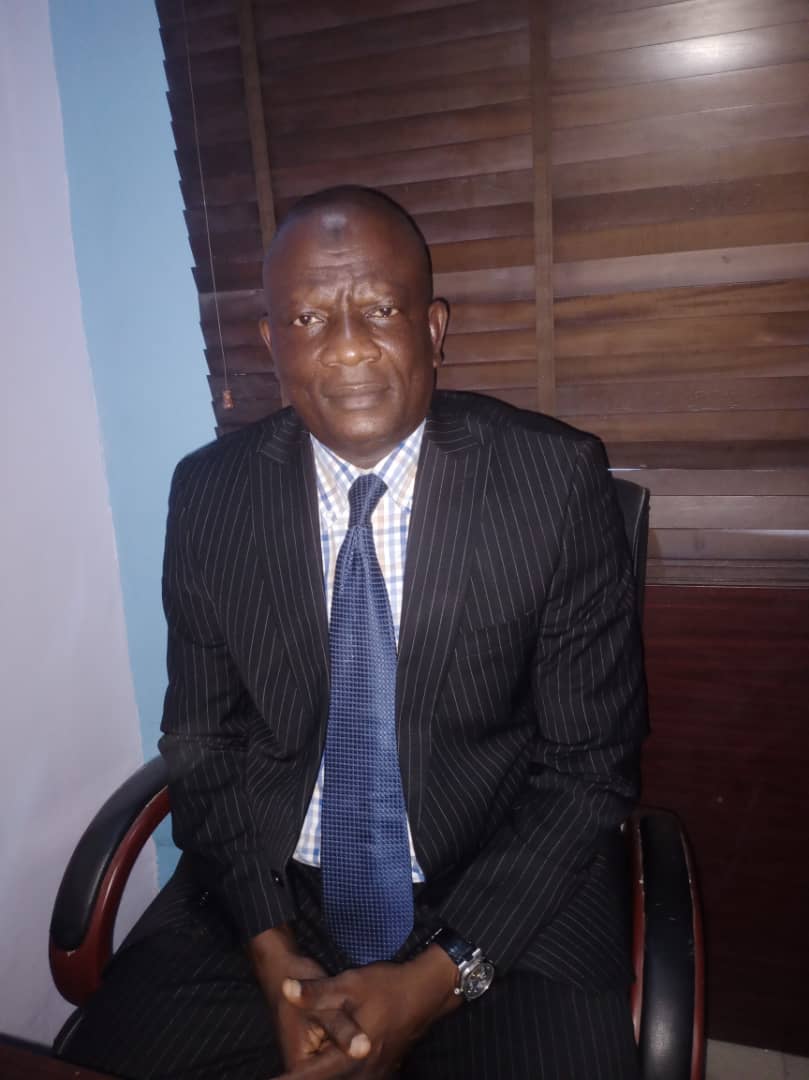
Hon Sulaimon Ayokunle, the elected Secretary of the PTML Chapter of the Association of Nigeria Licensed Customs Agents (ANLCA) is the CEO, Sula Marine Gold Ltd and SSA (Media) to the National President of the Association, Mr Kingsley Emenike Nwokeoji.
On the sidelines of the inauguration of chapter executives of the body in Lagos, Thursday, Hon Ayokunle spoke to Falcon Watch Online Daily on some trade facilitation platforms the Nigeria Customs Service (NCS) is currently implementing including the AEO, B’Odogwu, etc. How do these and other trade facilitation tools ultimately affect the operations of the average ANLCA member? According to impression in certain quarters, are customs clearing agents and other stakeholders not being subjected to payment of additional duties and loss of marginal profit they ought to make as return on investment?
Izuchukwu Ozoemena reports.
Q:
The Authorized Economic Operator (AEO) in trade facilitation is currently trending. Is it of any benefit to the customs clearing agent in the present dispensation?
Ans:
The creation of the AEO shows that it is an advanced model of fast-track procedure for cargo clearance. For you to be a beneficiary, you must meet up with certain criteria set out by the Nigeria Customs Service. What is the importance of fast-track? Fast-track is to facilitate trade for low risk importers. I’m talking about importers that are very low in risks such as manufacturers of goods who bring in homogeneous consignments in quantity. The introduction of the AEO is an advancement just to make sure that as the vessel arrives, you can take delivery of your consignment seamlessly. But you must be able to be up to the task because the condition is not just lower in terms of criteria to that of the fast-track beneficiary. It is an improvement on fast-track procedures introduced by the Customs.
Q:
Even as the AEO regime is in place, Customs talks about B’Odogwu, another trade facilitation tool. There are concerns that insufficient stakeholders sensitization should have preceded the simultaneous introduction to avoid confusion. Your take!
Ans:
They are two different things. AEO, as it is known, is basically for importers that are near 100% compliant. AEO is an improvement on fast-track procedures while B’Odogwu is now the new face of customs clearing machine. B’Odogwu is a process; AEO is a procedure. B’Odogwu is a clearing machine coming from NICISS 11 run by Webb Fontaine. When you talk about B’Odogwu, it is what we already have in the system for everybody. Whether you’re on fast-track, diplomatic or physical examination, you must pass through the B’Odogwu clearance machine.
Formerly, we were on the NICISS 11 procedure; even some of the Commands are still on NICISS 11. But B’Odogwu has come to stay at PTML.
PTML was used as a pilot scheme for B’Odogwu. It’s now moving to Tincan and Apapa. What we are telling Customs is that all the teething problems noticed at PTML must be addressed. For instance, you couldn’t connect for examination automatically, you couldn’t attach your documents, even your payment sometimes would not be through with banks used by Customs for collection of duty and other taxes. These teething problems should be sorted out. All banks ought to be integrated on the B’Odogwu clearance procedure. With the same B’Odogwu, you have different channels for clearance. Meanwhile, AEO is just another arm of the clearance process. It’s not a machine, just like you have the one that goes through physical examination, fast-track procedure and the one that involves diplomatic goods, you still have to go through B’Odogwu.
The modernization process of Customs is never static; it is still work- in – progress
The cost has been stated with import and export and, basically, they’re too many.
We are talking about reducing costs and facilitating the process and Shippers Council is talking about ICTN. They should tell us everything that surrounds cargo tracking note because to us, it is another way of adding costs to importation.
Q:
As Customs emphasizes revenue collection, how do you think government should manage the Free Trade Zones?
Ans:
Free Trade Zones are supposed to add to the GDP of the economy. You know it is a special zone for production from where other goods will be exported, not that Customs will not have their revenue once those commodities are to be taken out of the free trade zone. Remember it is specifically meant for those people that have the capacity to produce. The more they produce, the better for us because we can’t continue to be a consuming nation.
So, don’t let us look at it from only the angle of revenue. Let us look at it from the angle of the value being added to the economy.
Q:
What is your view concerning the suspended 4% FOB charges on imports?
Ans:
Customs Act 25 of 2023 contains the issue of 4% FOB charges. However, there is a proviso that for any of those things to be implemented, there must be extensive stakeholder enlightenment and collaboration. Then, how did we come to 4%? Remember we are talking about 4% of FOB in foreign currency – currency of the shipping nation. Sometimes, you might even have more money from that than 4% because even certain consignments that attract zero duty and deserve not to be taxed, yet they pay 4%. Already, Customs has 1% CISS.
We don’t know how 7% surcharge is being distributed. Now another 4% of FOB under the present dispensation that the sector is struggling to survive. You know that without these manufacturers, there is no economy. They add their value to the economy by bringing in their raw materials, yet you add another tax. I don’t think this is the right time to introduce this.
Personality Interviews
1. EXECUTIVE PLATFORM. AMES 2024: TIME TO CHANGE GOVERNMENT ATTITUDE TOWARDS SHIPPING DEVELOPMENT IS NOW, AMES President Charges FG.
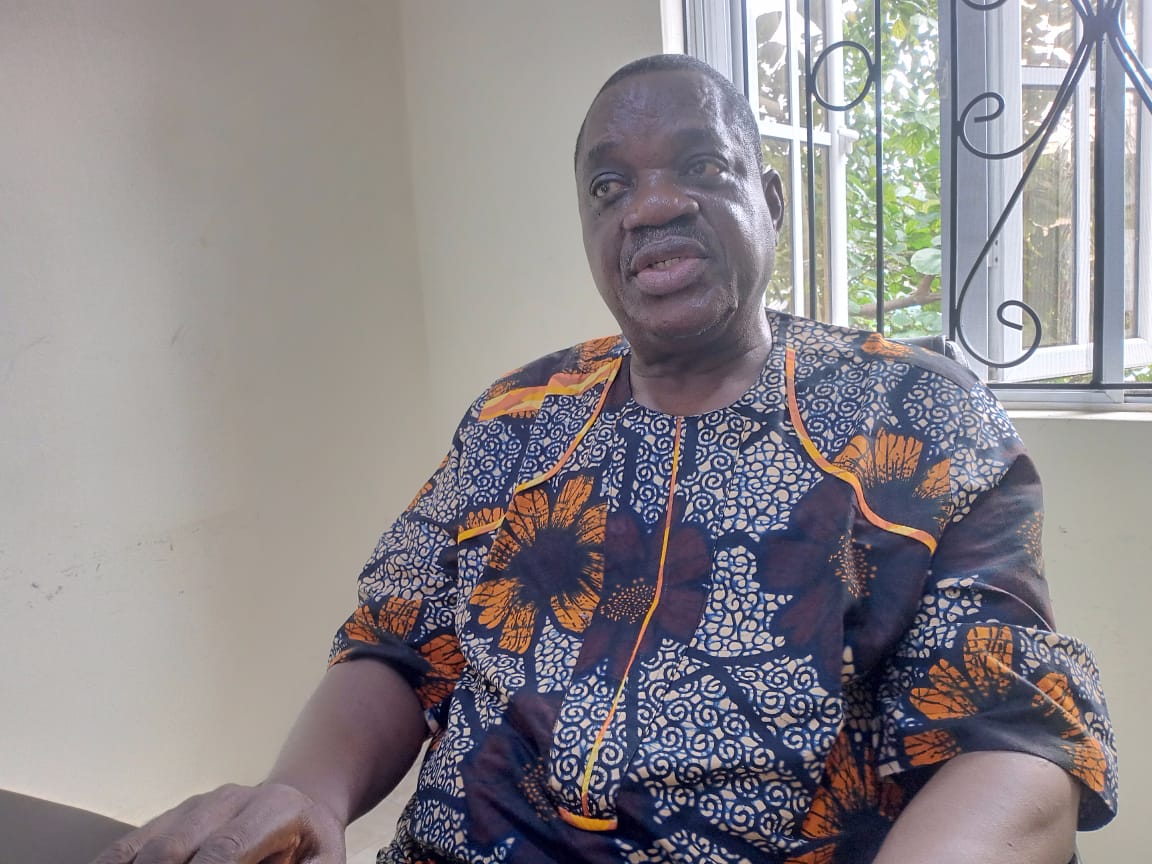
Sequel to the well-attended 16th Marine Technical Summit organized in Lagos recently by the Association of Marine Engineers and Surveyors (AMES), the President, Engr ISRAEL OBADAN – a marine engineer of note – featured as guest of Falcon Watch Online Daily.
In this exclusive interview, Engr Obadan dwelt on a number of industry-centric issues including shipping generally, the fate of indigenous shipping development in Nigeria, government’s lack-lustre attitude towards seafarers’ sea-time training, the MAN Oron, and other matters. The encounter was quite engaging.
IZUCHUKWU OZOEMENA reports.
Q: Who is Engr Israel Obadan?
I am a marine engineer by training. I belong to that generation of Nigerian youths in the 70s awarded Federal Government scholarship to study marine engineering in England, America, Russia, etc, to develop the Nigerian maritime human capacity. It was a deliberate policy at that time to involve the third world countries in maritime development. I still regard the set of political leaders who conceived this idea as very visionary. They were able to latch onto the developmental policies of the time globally. Nigeria, Ghana, in fact the entire West Africa and Arab nations such as Kuwait, Saudi Arabia, UAE, Iran, etc, floated shipping lines. Nigeria was fortunate to have political leaders at that time with the foresight who keyed into the concept. It was in that era we had the UNCTAD code developing- the 40-40-20 cargo sharing formula. The United Nations came up with the idea of UNCTAD to help the maritime industry of the third world countries.
Prior to that time, just before and after independence, people like Nnamdi Azikiwe and other political leaders were into it. As at then, Ghana had started it because they were the first in everything developmental. By 1960, after independence, Nigeria followed those developmental strategies. That was when the Nigerian National Shipping Line (NNSL) was birthed and it started acquiring old vessels to take off. Those vessels were manned by foreigners because we didn’t have the human capacity as at then.
With the NNSL formed, the idea of training and developing the human resources capacity came up and that was when the political leaders latched onto the training programme I talked about earlier. So, the authorities started awarding scholarships to the youths of our generation.
After secondary school, I attended Auchi Polytechnic for my ND in Mechanical Engineering. After that, we were fortunate enough to be awarded the scholarship all over Nigeria. There was no tribalism or sectionalism then. It was purely on merit. That’s why if you see the generation I am referring to now, almost all of us could go to any university to impart knowledge and leadership training. As at that time, training was at UK, Russia, US, etc just to develop the maritime manpower.
It was a good thing and I will say with that maritime development policy, Nigeria blossomed internationally. The NNSL became a national pride in Africa if not the world. We went to the same school with white people and Arabs. The oil boom came up; money was not really a problem. That programme was responsible for developing the maritime industry human capital and it lasted for at least 50 years – constantly training, recruiting young Nigerians. After our generation, another generation came up; there was no break. Today, the remnants of us are trying to keep on while many senior colleagues have passed on. Thank God, the junior ones that came up after us now had to resort to self-training. That policy had derailed!
Q: Can you compare your training experience with NIMASA’s current National Seafarers’ Development Programme (NSDP) abroad?
ANS: The training programme we passed through lasted for 30 unbroken years. That programme derailed the moment Nigerians decided to take over the management of the NNSL. We must tell ourselves the truth. As at that time, management of the shipping line was based in UK. It was run by white people and you have to give it to them.
The problem started when a civilian government took over from the military and the typical Nigerian bragado set in: ‘we want to take over our destiny to save foreign exchange’ – those jargons and all that. That was the beginning of the rot. Even after that, the Federal Government bought 19 brand-new ships, at the same time countries such as Kuwait and other Arab nations bought their vessels as well. The difference with us in that fleet development effort was that Nigeria focused on one type of trade – general cargo trade mixed with a bit of containerization. But other countries such as Kuwait took advantage of their natural endowments to invest in oil tankers to lift wet cargo which is what we should have done as well.
Till today, Nigeria still doesn’t have that political will to venture into wet cargo -crude oil
lifting and refined petroleum products transportation at least. Our refineries are dead. Even when operational, we had coastal transportation and that was all.
Now, the NIMASA training programme you talk about, this is the problem with us as a people. When that programme started, one expected that it would be developed and run by the older generation that knows about shipping, the practitioners. As far as I know, they were not consulted. The bureaucracy in the office just decided on their own, ‘we know it all. We don’t need to consult the professionals. We can do it all by ourselves.’ They embarked on that policy, everybody gate-crashing in the typical Nigerian way to take his bit, to partake in the programme. You know as well as I do the outcome today. They sent our boys and girls to India and other places. The time I’m talking about our generation and training was in the early 70s. Then, India, Phillipines and others who sent their boys and girls to train with us as well were nowhere compared to Nigeria’s maritime industry.
I was recruited late 80s in Singapore as a marine engineer from Nigeria here because they didn’t have the human capital to drive their industry that was just developing. They went all over the world recruiting, mostly Africans probably because they got us cheaper – Ghana, Nigeria, Singapore, Malaysia, etc. As at then, our own shipping line was going down. Generations of us that were trained were losing spaces to work, and luckily, countries like India, Singapore, Malaysia were developing theirs. That’s how some of us professionals were recruited. As a marine engineer in Singapore, I was paid extra allowance because I have a British certificate. They call it superior ticket allowance – extra $200 to my monthly pay. They devoted themselves to developing their own maritime industry. But today, compare them with Nigeria, we are nowhere.
What I am talking about is nobody can put a hand in the quality of training of those Nigerians of our time all over the world. The so-called trainees graduatiing today, there’s no provision for them to practise their profession. They’re all over the place and there are those that are lucky to go abroad to seek spaces in foreign shipping companies. In other words, we’re just training our boys and girls for foreign shipping companies because there are no shipping companies in-country to absorb them. What we are talking about is that there is no structured training now unlike during our own time. It was not us that designed it. It was the bureaucracy, ministries and politicians of our time that designed it. They had the vision and knew exactly what type of programme to design for the citizens. But how come the younger generation of political leaders decide to design a training programme that is of no use to the country? If you say you are developing your industry, you must have a place to absorb the graduates trained to develop your industry especially maritime because it is a specialized profession unlike other types of engineering.
There’s no much I can say about the NSDP apart from the fact that it has not benefitted us. It’s sad and frustrating because I can imagine the condition the cadets are into. Some spend as much as one year waiting for employment in vessels. If you say you are a marine engineer but there’s no place to practise the profession, too bad!
Q: What stands a marine engineer out from engineers in other fields?
ANS: Engineering is wide. Marine engineers are simply the professionals you can simply refer to as ship engineers. But again, it is not only ships. I will say the word ‘marine’ actually defines it: sea-based, ocean-based type of a thing. We call marine engineers mechanical engineers at sea. The closest to marine engineers are mechanical engineers because they can do the same type of job without getting lost. But again the marine engineer proper is the one that people know as the professional that works on ships and maritime assets such as oil tankers, oil rigs, passenger liners. It is a dedicated type of training towards such assets. Dedicated type of training in the sense that it is regulated in terms of safety because of so many things that are involved which includes life, properties and assets that are worth millions of dollars.
To build a passenger liner now, you’re talking about a minimum of $1bn because passenger liners or coaches are getting bigger and bigger, more like floating cities. A lot is involved.
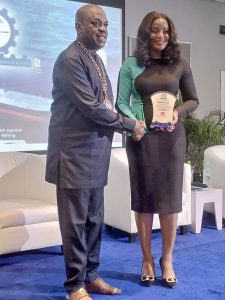
Engr Obadan presenting a special award to Iro Ogbeifun, CEO, Starts Investment Ltd at the 2024 AMES Conference/AGM
Q: There were concerns at the 2024 AMES event that following what foreign ship owners in Nigeria are doing to them, indigenous ship owners are getting frustrated by the day, selling off their vessels. Is it right?
ANS: Because our economy has not developed to an extent that you can say it’s based on privatization, it remains a mixed economy, mostly government-driven and reduced private involvement. Nigerians are hardworking people. Let me use Africa as an example. It’s difficult to see private citizens venturing
into businesses like maritime. I know this because we go to some of these countries. If you go to Lome Port, offshore Togo anchorage, for instance, you see private Nigerians providing services. It’s the same in other Francophone countries such as Benin, Cote D’Ivoire, etc as I have experienced in my trips to inspect ships offshore. Their system is so regulated. But in Nigeria, the ports authority takes charge of such services. In those areas, Nigerians arrange and provide services, the Francophone boys are not involved.
Unfortunately, in Nigeria, we have a failure of leadership. If we have a single leadership that can really direct the people, this country can take off. I have visited many countries of the world and compared them with Nigeria. The only thing they have different from us is sound leadership.
Our maritime training institutions are another problem. The boys finish their academic training and the international regulation is that you cannot be certificated unless you go for sea practice at least for one year. You cannot call yourself a marine engineer if you don’t do the course. Again, why are there no ships for them to practise sea training? As I told you, the training we had was based on a focused policy developed by the government. As they were training us, they provided vessels for us to have practical experience and to continue with our career. But we don’t have that today.
There are different types of ships for trading. If as a people you can’t compete at the international stage in other types of maritime trade like general cargo, containerization trade, we have the LNG which is another type of trade. At least, they’re engaging Nigerians as we take advantage of our natural gas. What about the oil? Crude and refined products even though the refineries are dead. The offshore industry is there as well. Those are specialized fields to service the LNG industry. But there’s no government involvement or empowerment of the people. How do you explain it that generations upon generations, Nigerians are not involved in the official lifting of our crude? No country does that! It’s our own, not on American soil.
Q: What is your practical suggestion to government on how to overcome this matter?
ANS: Very simple! It’s a policy issue! Political will to say ‘this oil you’re coming to take from us, we want to have more of it for our people even if in terms of maritime and human capacity development. Build it into the contract that in your training policy, you must have this number or percentage of Nigerians on each of your vessels. People have been trading with Nigeria since the 50s when oil was discovered in Oloibiri. If we say we don’t have the ships to take the oil from there, what stops you from saying ‘I have this problem: training and developing our maritime manpower, our youths must get involved, train them?’. When I say train them, they’re not doing us a favour. This could have taken care of the Niger Delta restiveness over the years.
When I say leadership, it is a matter of policy. When Alfred Diette-Spiff was Rivers State Governor, he was just 27 years old. He devised a policy of developing his citizens in Rivers State. Some of them were my colleagues and they’re still there. I know how far they have gone in development. Charkins Maritime Academy, the best maritime training institution in Port Harcourt today is owned by one of them. Those are the things we’re talking about – a policy by the government. Nothing more but the political will. Develop a policy to train your youths, put them on ships to enable them become professionals that can contribute to the economy. They are not going to be liabilities. The politicians cannot tell us that the money is no longer there. In fact, we have more money now.
Q: Still on training, how can you rate the Maritime Academy of Nigeria, Oron, today in terms of management, training, physical infrastructure, curriculum, etc?
Ans: I am happy you raised the issue of MAN, Oron. Any time people talk about that institution today, I feel like dancing. You know why? The present Rector, Commodore Duja Effedua, only came in about five years ago. Oron had been in existence since 1979. From then till when he came in, MAN was not an institution you could be proud of. The only time development was noticed was when the late Engr Akinsoji was Rector because he was a sound professional himself. You must have professionals to run their industry. Unfortunately, Nigeria has this mentality that anybody can do anything. It doesn’t work that way! It’s not in all industries that can happen.
So, when I talk about that school, I feel like dancing. The curriculum was designed as at the time Olu Akinsoji started it. But later, politics reared it ugly head and it became a victim of the typical Nigerian politics. Some of the local people said he’s not from there. That became the bane of the institution for a very long time. Other professionals were brought in to run the school but they didn’t have the freedom to run it the way it should have been run. The school was struggling over the years, churning out graduates that found themselves on their own until eventually they brought in the present Rector.
Before he came there, it was like a glorified secondary school in terms of infrastructure, quality of lecturers, etc. For the key mandate of the school, you must try and get the right professionals. That one could not happen. I will tell you one of the reasons government brought in the present Rector was to quell restiveness and local politics. Today, to God be the glory glory, in less than three years, that guy has turned around that place in so many aspects. I tell people that if in Nigeria that has looked so unworkable for many generations we can get a man like that as the administrator of that school, Nigeria can be fixed in no time. It doesn’t take forever to fix a country! But when Nigerians talk, they say it took America 200 years to get fixed. All the Asian Tigers, including Singapore, it took them less to time. I always hold that school as an example. Because of that man, I always have a sentimental attachment to that school.
-
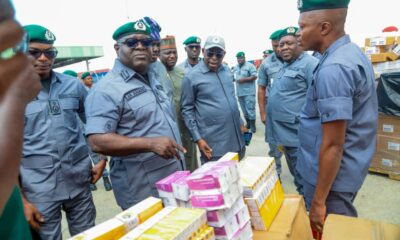
 Maritime Agencies2 weeks ago
Maritime Agencies2 weeks agoPTML Customs Hits Over N350Bn in 9 Months, Intercepts ₦200m Illicit Pharmaceuticals,
-
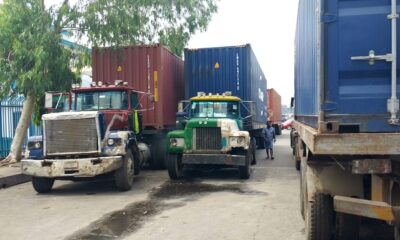
 Maritime Agencies1 week ago
Maritime Agencies1 week ago Stakeholders Cry Out, Seek FG’s Intervention To Avoid a Return of Apapa Gridlock.
-
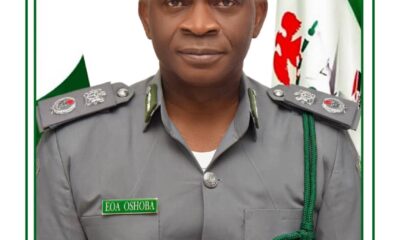
 Maritime Agencies2 weeks ago
Maritime Agencies2 weeks agoFocus on Innovation, Integrity and Continuous Learning, Apapa Customs Boss Charges Newly Promoted Officers
-
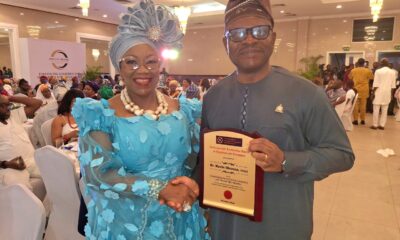
 Maritime Agencies1 week ago
Maritime Agencies1 week agoCILT Honours Dr Okonna, MAN Oron Acting Rector, with Outstanding Leadership and Service Excellence Award
-
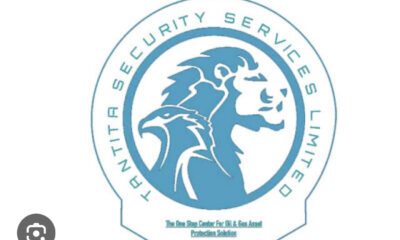
 Maritime Agencies1 week ago
Maritime Agencies1 week agoOTC 2026: Tantita Secures Approval for Lecture on Drone Security
-

 Maritime Agencies3 days ago
Maritime Agencies3 days agoBADAGRY: Customs Broker Deplores Role of Unapproved Checkpoints As Baggage Maritime Magazine Celebrates
-
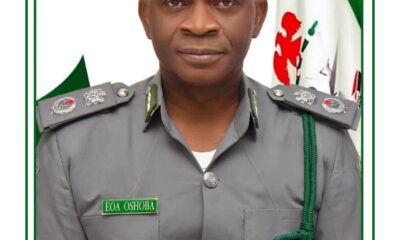
 Maritime Agencies3 days ago
Maritime Agencies3 days agoOCTOBER REVENUE: Apapa Customs Breaks Record, Nets 304Bn In A Month
-
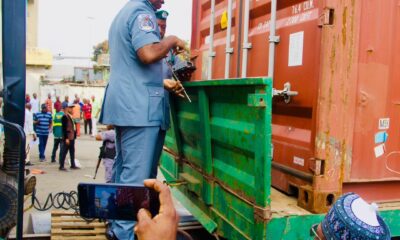
 Maritime Agencies2 hours ago
Maritime Agencies2 hours agoApapa Customs Unveils ECTS To Deepen Trade Facilitation, Boost Revenue And National Security.I


